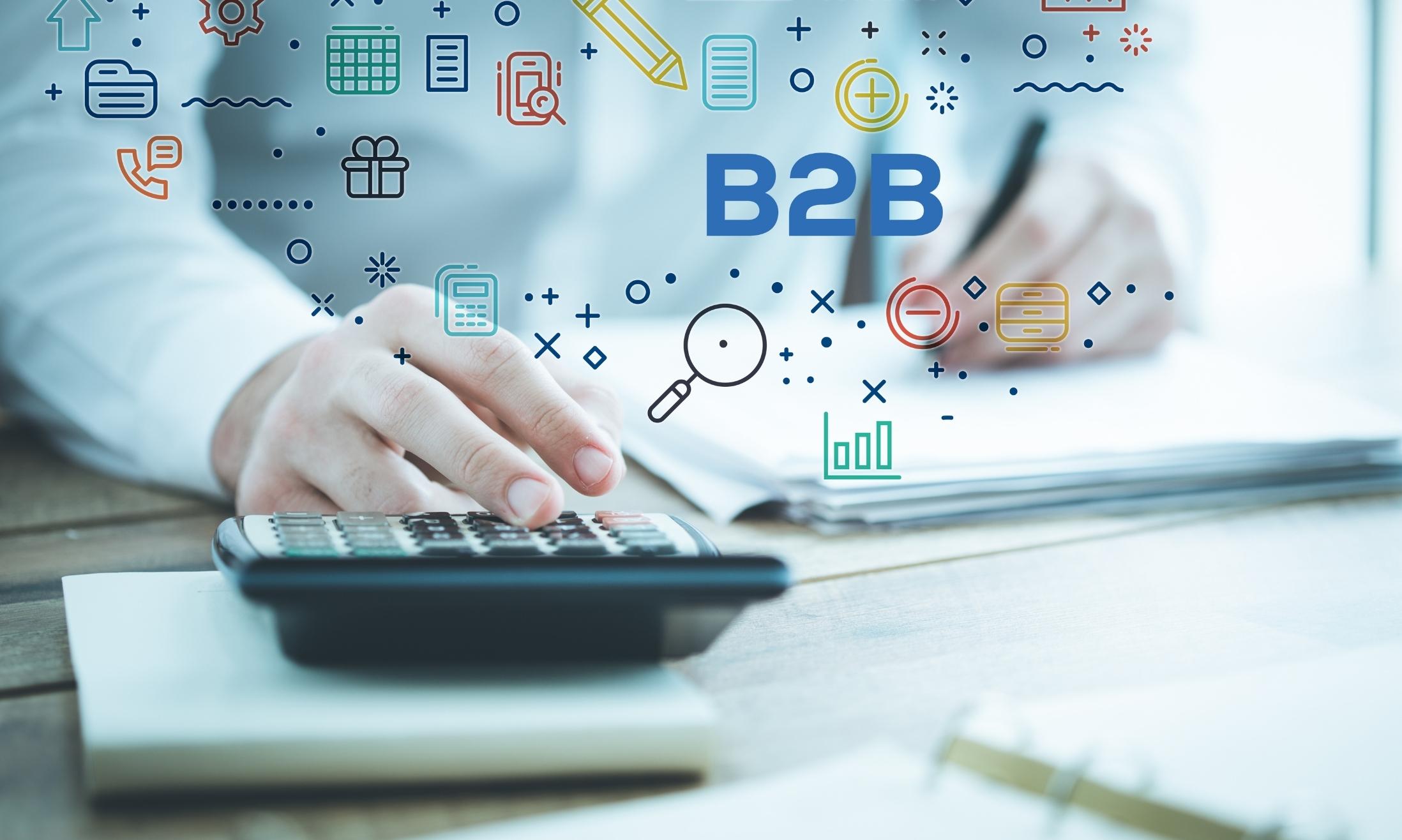Have you ever wondered where businesses go shopping?
Just like you might browse through Amazon or eBay to find the perfect pair of sneakers, businesses also have their own special shopping malls online. These aren’t your average shopping sites, though.
They’re gigantic digital marketplaces where businesses buy and sell everything from tiny screws to huge machinery, and everything in between.
In this blog post, we’re going to explore the top 10 biggest B2B eCommerce marketplaces in the world. These platforms are where the magic happens in the business world, connecting companies with manufacturers, suppliers, and services they need to grow and thrive.
What Is a B2B Marketplace?
Imagine a giant online store, but instead of buying things for yourself, businesses buy stuff they need from other businesses. This is what we call a B2B (business-to-business) marketplace.
It’s like a special club for companies to find suppliers, buy big amounts of goods and services, and take care of their deals with other companies. It’s different from websites like Amazon where you buy things just for you or your family.
In a B2B marketplace, companies are usually looking to buy lots of things at once, not just one or two items. This is called bulk transactions, which means buying large quantities.
These marketplaces have a huge list of products from many different suppliers. Whether a business needs something very specific for a niche industry or something more common, they can find it here.
The Perks of Using a B2B Marketplace
A B2B marketplace is like a super-tool for businesses, whether they’re buying or selling. It makes a lot of things easier and can help businesses save money and find more customers. Let’s check out how:
For Buyers
- Find More Options: B2B marketplaces are like maps that show you where to find suppliers from all over the world, not just from your neighborhood.
- Get the Best Deals: It’s like going to a huge sale where you can compare prices from different sellers. This way, businesses can save a lot of money by finding the best prices.
- Shop Efficiently: Instead of running around to different stores, everything you need is in one place. You can order, talk about prices, and keep track of your shopping all on one website, saving you a lot of time and hassle.
- Discover Cool New Stuff: There’s always something new and exciting in these marketplaces. Businesses can find new products that could make their work even better.
- Know What You’re Getting: With reviews and ratings, businesses can see what other people think of a seller before they decide to buy, making it easier to trust their choice.
For Sellers
- Be Seen by More Customers: It’s like having a shop in the busiest part of town. B2B marketplaces help sellers show off their goods to lots more businesses that might want to buy from them.
- Save on Marketing: Instead of spending a lot of money on ads, sellers can meet buyers directly in the marketplace, making it cheaper to find new customers.
- Grow Easier: Want to sell more stuff or find more people to sell to? Marketplaces make this super easy, without needing a bigger store or more salespeople.
- Learn from the Market: Sellers can see what’s trending, what prices are good, and what buyers want, helping them make smarter business decisions.
- Go Global: It’s like opening your store in countries all over the world without having to move. Sellers can reach customers far away, making their business international.
In short, B2B marketplaces make buying and selling easier, cheaper, and more exciting for everyone involved!
Challenges with B2B Marketplace

While B2B marketplaces offer fantastic opportunities for businesses to expand and thrive, it’s not all smooth sailing.
One significant challenge for sellers in these marketplaces is the intense competition. It’s akin to being in a crowded race where everyone is vying for attention. Sellers have to work extra hard to stand out, whether through pricing, product uniqueness, or building a solid reputation.
Additionally, marketplaces often charge commission or subscription fees, which means sellers have to share a slice of their profits with the platform. This can eat into their earnings and make profitability harder to achieve.
Sellers also face limitations in how they can interact with customers and present their products. Marketplaces tend to standardize many aspects of the selling process, which can leave sellers feeling like they have little control over their customer’s experience. This standardization can dilute their brand identity and restrict their ability to offer a unique shopping experience.
Lastly, both buyers and sellers can find the complexity of B2B transactions challenging to manage within the marketplace. These transactions often involve detailed negotiations, specialized pricing strategies, and complex shipping arrangements that some platforms may not adequately support.
Top 10 Best B2B eCommerce Marketplace
In 2023, experts at Grand View Research found out that the global business-to-business (B2B) eCommerce market was worth a whopping USD 18,665.95 billion. That’s a lot of money moving around as businesses buy and sell things to each other over the internet.
With so much activity, it’s no wonder there are many online marketplaces out there designed just for businesses to connect and make deals. But with so many options, which ones are the best?
Let’s dive in and discover some of the top B2B marketplaces that are making a big splash in this giant ocean of business trading.
1. Amazon Business
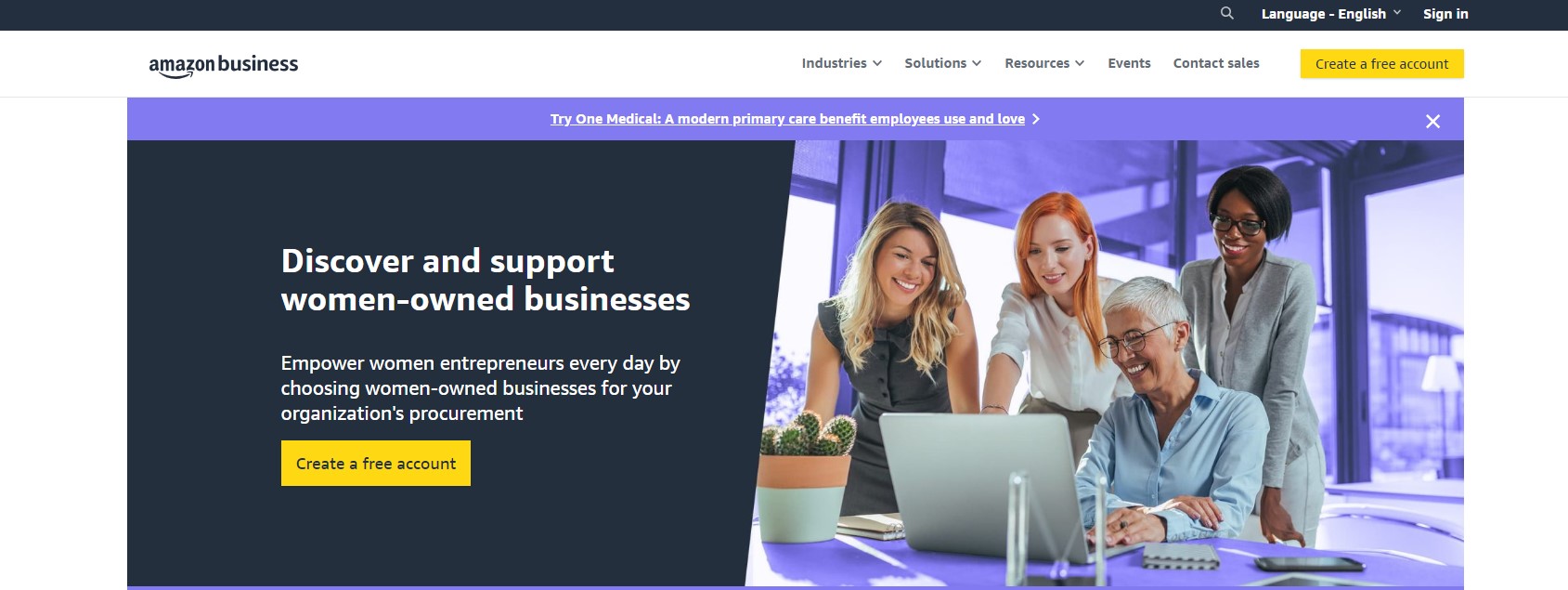
Amazon Business takes the Amazon experience we all know and tailors it specifically for business-to-business transactions, making it a go-to platform for companies, institutions, and resellers looking for an efficient way to manage their purchasing needs.
It’s like having a massive online store but for businesses, providing a convenient and familiar interface to shop for a wide range of products.
What sets Amazon Business apart are its features designed with businesses in mind. Organizations can create accounts for multiple users, allowing teams to shop together while managing permissions and approvals to ensure controlled spending.
They also benefit from bulk discounts and quantity pricing, which can lead to significant savings on large orders. For businesses eligible for tax exemptions, Amazon Business simplifies the process, making tax-free purchasing straightforward.
2. Alibaba

Originating from China, Alibaba stands as a towering figure in the B2B e-commerce world, connecting businesses not just with suppliers and manufacturers from China but from across Asia too.
Alibaba’s strength lies in its vast network of suppliers. Picture hundreds of thousands of manufacturers all gathered in one place, ready to fill large orders for businesses around the world. This is especially valuable for companies looking to buy in bulk, seeking the best deals for high-volume purchases.
One of the key features that make Alibaba stand out is its Trade Assurance program. This acts like a safety net, offering protection to buyers through escrow services and supplier verification.
This means businesses can shop with more confidence, knowing there’s a system in place to reduce the risks of international trade.
3. eWorldTrade
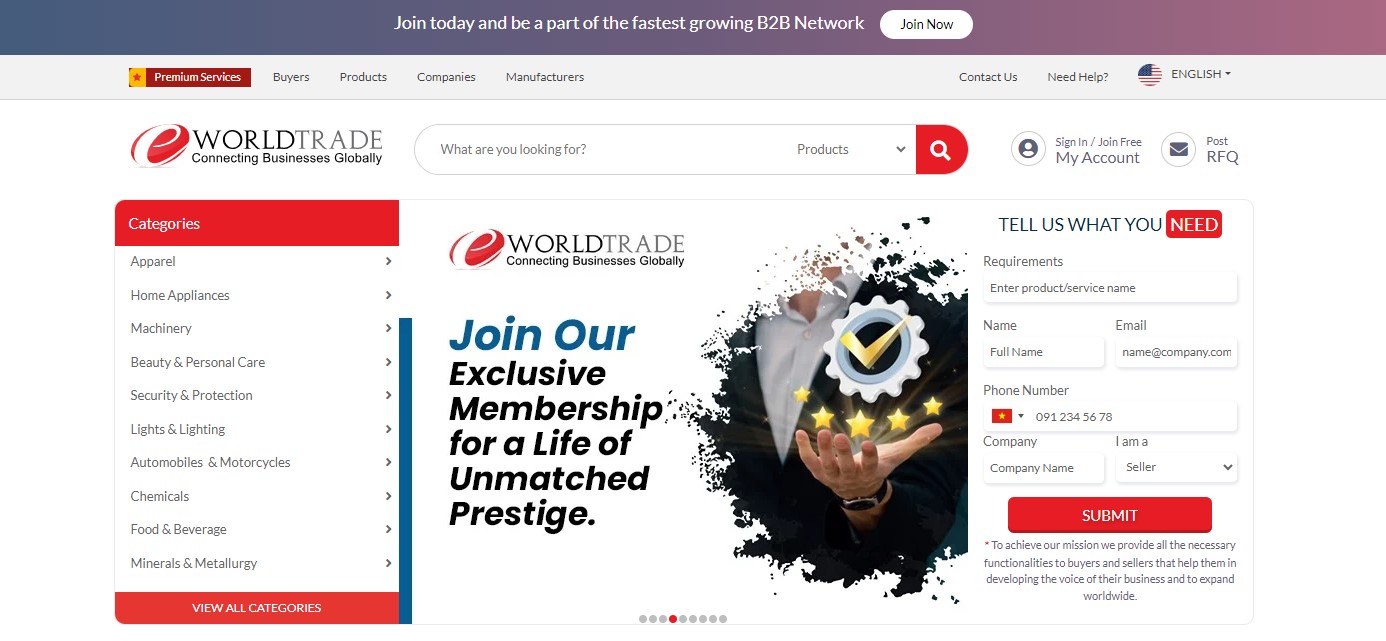
At the heart of eWorldTrade’s appeal is its global reach. This platform connects buyers with suppliers from many different countries, opening up a world of possibilities for businesses looking to source products or find new markets.
The marketplace is structured to cater to a wide range of needs and preferences, offering different membership packages that come with their own set of features and benefits.
From free options for those just starting out to more advanced paid tiers for businesses looking to maximize their exposure, there’s something for everyone.
What sets eWorldTrade apart is not just its ability to connect businesses globally, but also the layers of support it provides. With measures in place to protect both buyers and sellers, the platform ensures that transactions are secure and risks are minimized.
4. IndiaMART
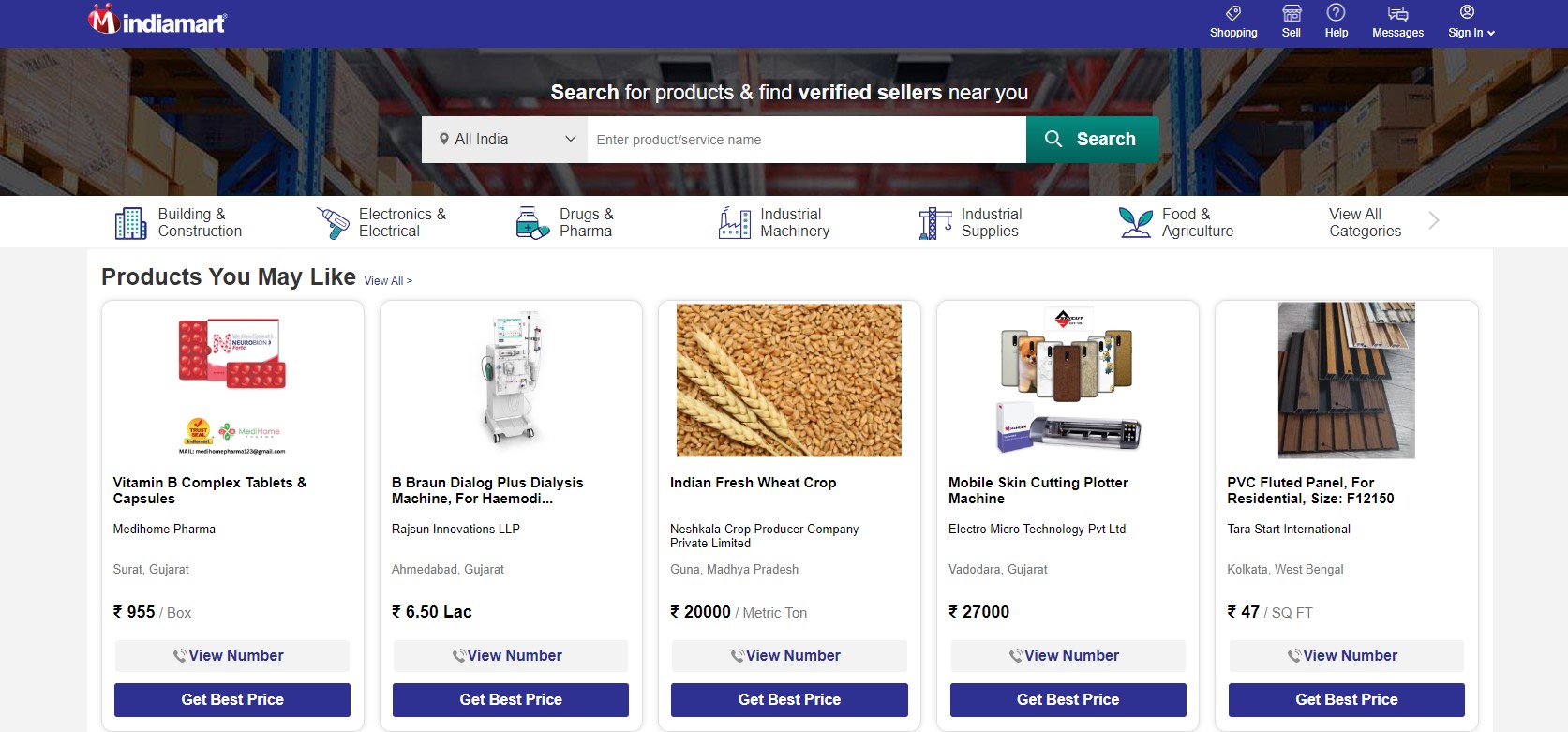
IndiaMART has been a cornerstone of the Indian B2B marketplace since its establishment in 1996, offering a robust platform designed specifically for the Indian market.
As India’s largest online B2B marketplace, it serves as a vital bridge connecting buyers and suppliers across the country, facilitating the discovery of products, the initiation of transactions, and the request for quotes with ease.
What makes IndiaMART stand out is its deep focus on catering to the specific needs and dynamics of the Indian market.
This specialization allows businesses operating within India to navigate the local market more effectively, making it easier to find or supply products that meet the precise demands of this vast and varied landscape.
5. Thomasnet
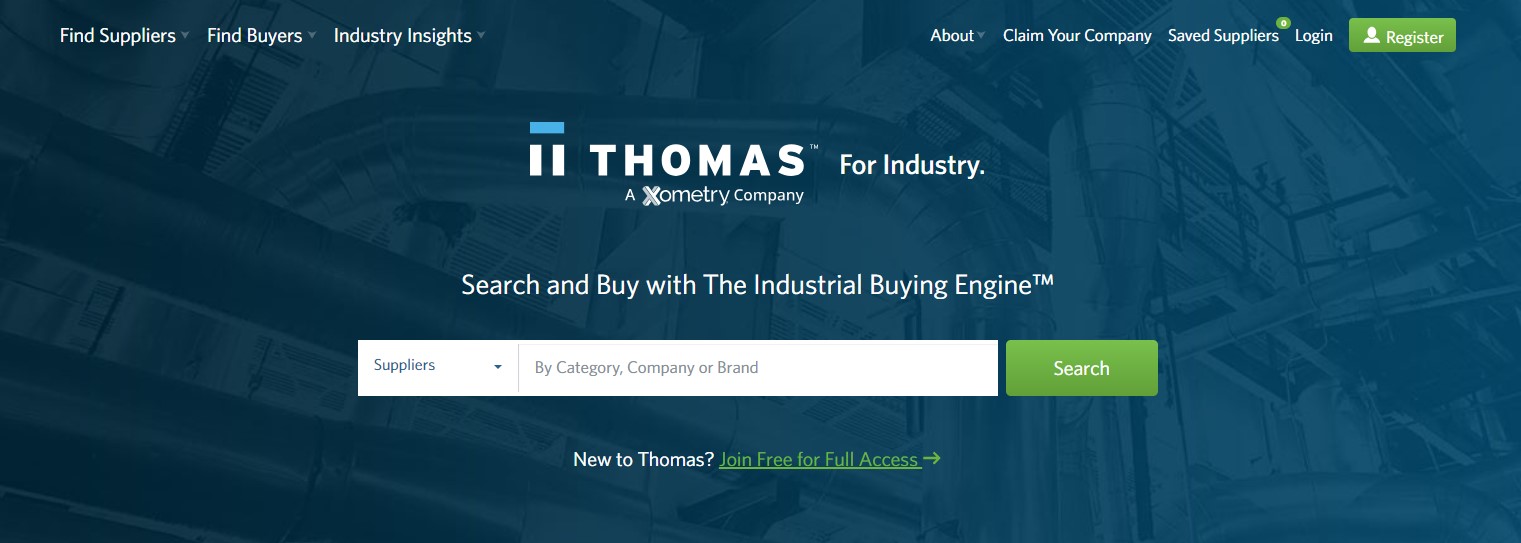
ThomasNet is a unique player in the B2B marketplace, particularly focused on serving the industrial sector of North America. It’s a modern evolution of the “Thomas Register,” which, for many years, was an essential directory for anyone in need of manufacturers and suppliers in the industrial world.
Today, ThomasNet has transformed into an extensive online platform that connects buyers with a wide range of industrial suppliers, distributors, and service providers, maintaining its legacy while adapting to the digital age.
This marketplace is especially valuable for those in industries such as manufacturing, engineering, and construction. ThomasNet is dedicated to the North American market, primarily catering to businesses seeking suppliers in the USA and Canada.
One of the standout features of ThomasNet is its detailed supplier profiles, which offer comprehensive information including suppliers’ capabilities, certifications, and full product catalogs. This depth of information supports buyers in making informed decisions when selecting suppliers.
6. Faire
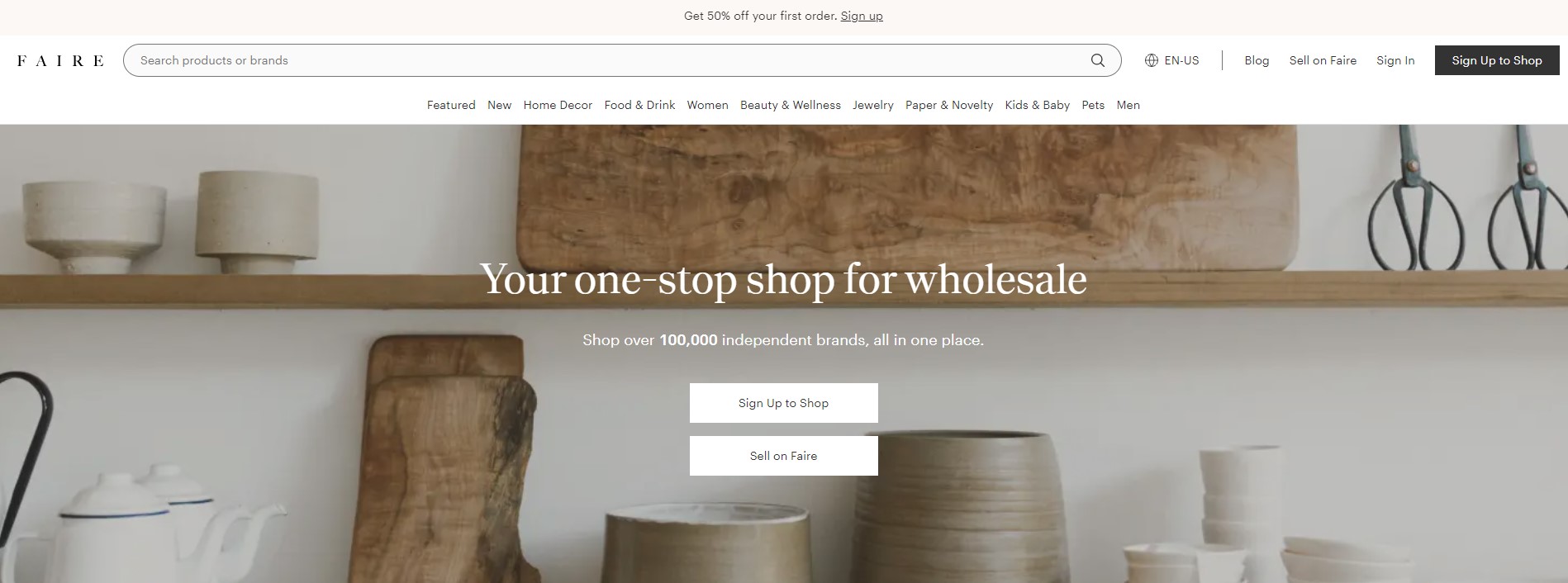
Faire is an innovative B2B wholesale marketplace that’s carving out a special niche by connecting independent retailers with distinctive brands and artisan makers from around the world.
At the core of Faire’s offering is its curated selection of products. Unlike other marketplaces where the volume can sometimes overwhelm quality, Faire takes a more selective approach.
It handpicks brands and products that not only promise high quality but also bring something truly unique to the table. This curation ensures that retailers can offer their customers items they won’t find just anywhere, making their stores destinations for discerning shoppers.
Understanding the financial pressures small retailers face, Faire introduces several features aimed at easing these burdens. Notably, its Net 60 payment terms allow retailers to sell products before needing to pay for them, which can significantly help with cash flow.
7. Global Sources
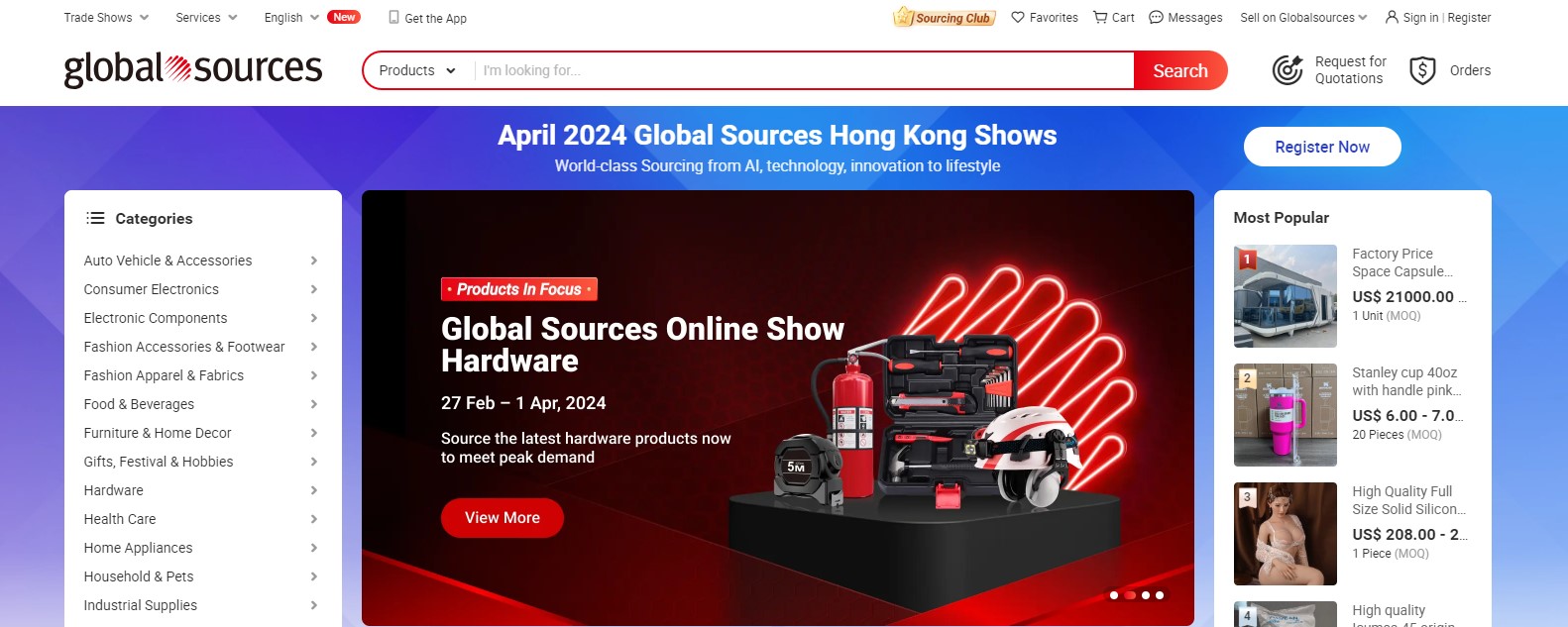
Global Sources is a veteran in the world of B2B marketplaces, having set its roots in Hong Kong in 1996. It has since established a solid reputation for bridging the gap between buyers worldwide and a vast network of manufacturers and suppliers primarily located in China and across Asia.
Ensuring confidence and trust in its platform, Global Sources places a strong emphasis on supplier verification. This process is designed to increase buyer confidence by ensuring that suppliers are legitimate and reliable.
Additionally, the marketplace boasts a diverse range of products across various industries. Whether businesses are looking to source electronics, fashion, or anything in between, Global Sources offers a wide selection to meet varied sourcing needs.
Moreover, the platform enriches the B2B sourcing experience with its Global Sources Magazine, which delivers industry reports and insights on the latest sourcing trends.
8. SoloStocks
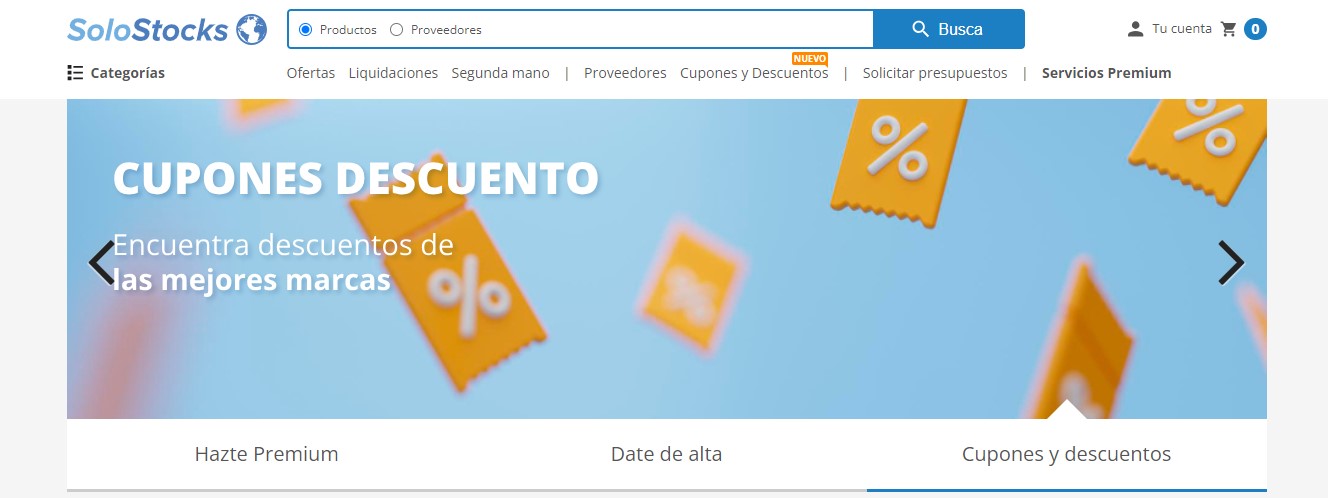
SoloStocks stands as a prominent beacon in the European B2B marketplace landscape, with its headquarters nestled in Spain and a robust presence across various European countries such as Spain, Portugal, Italy, and France.
Central to SoloStocks’ appeal is its strong focus on the European market. This focus ensures that businesses within Europe have a dedicated platform for connecting with buyers and suppliers in their region, fostering regional commerce and industry-specific networking.
The platform boasts an impressive catalog, featuring over a million products spanning multiple categories. Whether businesses are in search of industrial supplies, consumer goods, or anything in between, SoloStocks offers a rich variety of options to meet those needs.
One of the defining features of SoloStocks is its multilingual support, accommodating transactions in several European languages. This inclusivity significantly eases communication barriers and facilitates smoother business dealings across the continent.
9. Knowde
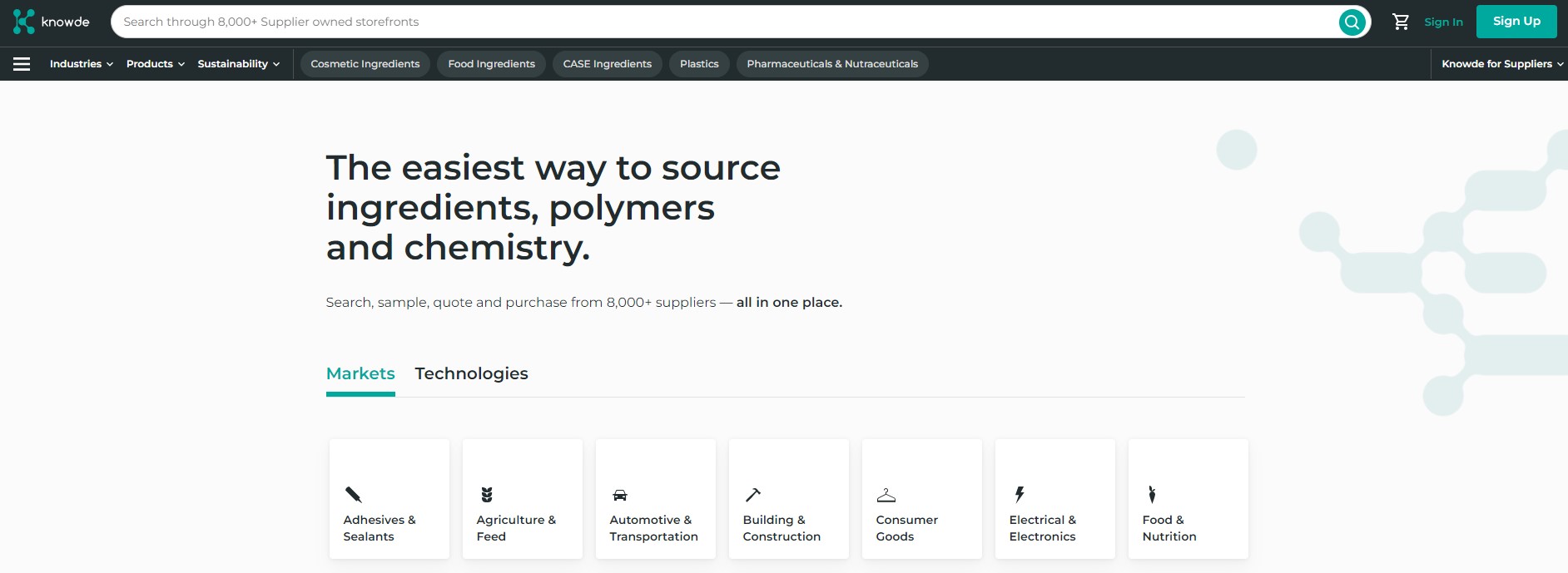
Knowde emerges as a pioneering force in the B2B marketplace, specifically catering to the unique demands of the chemicals, polymers, and ingredients industries.
Tailored precisely for the chemical and related industries, Knowde stands out with its specialized focus. It offers a massive, easily searchable catalog that spans a vast array of chemicals, polymers, ingredients, and raw materials.
Knowde is not just a marketplace; it’s also a valuable resource for industry knowledge. It provides access to market reports, news, and educational content that are relevant to the chemicals and ingredients sectors.
With one of the most extensive online catalogs dedicated to this sector, Knowde is breaking new ground in how businesses discover, compare, and procure the essential substances they need.
10. MFG
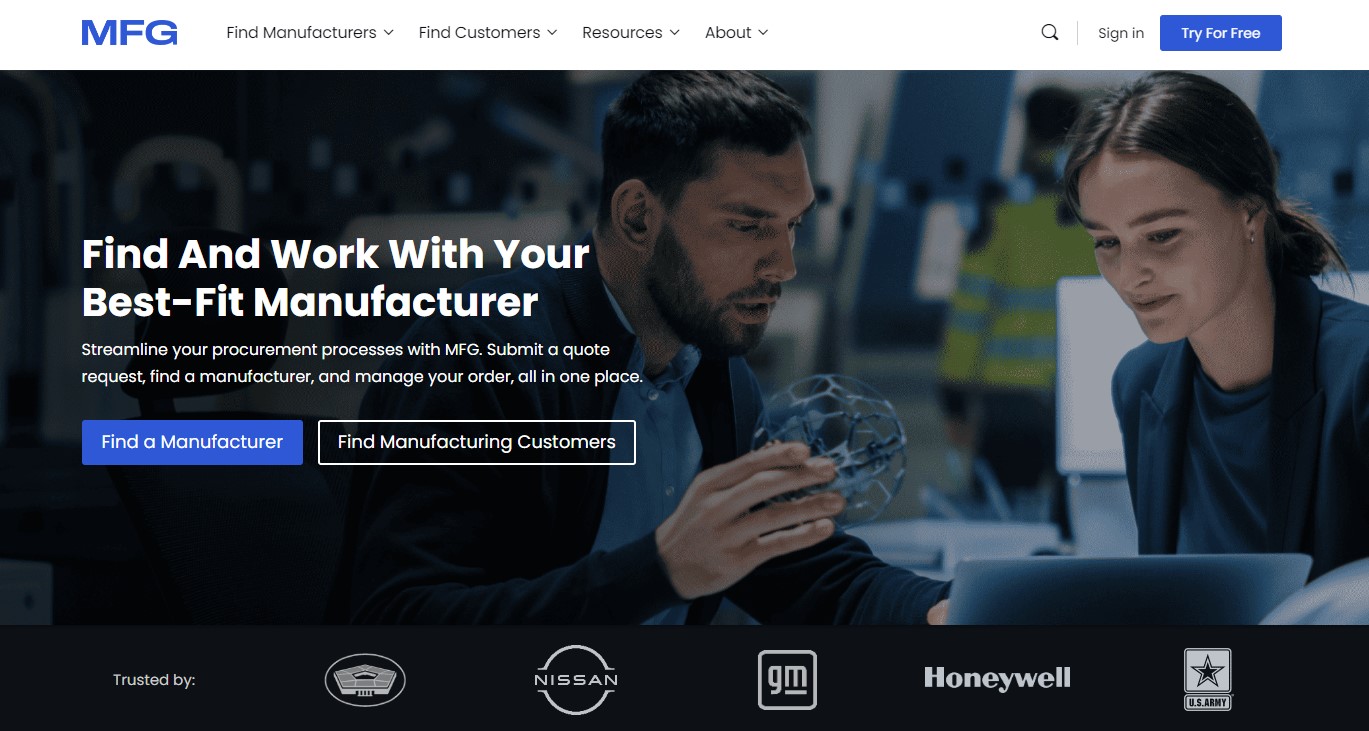
MFG stands out as a specialized B2B marketplace designed to seamlessly connect buyers with contract manufacturers and job shops. It serves as a crucial resource for companies in need of custom manufactured parts and assemblies, catering to a broad spectrum of industries.
What sets MFG apart is its singular focus on manufacturing. It’s a dedicated space for buyers who need custom-made components, assemblies, and comprehensive manufacturing services.
MFG spans a variety of manufacturing processes, from CNC machining and injection molding to 3D printing and sheet metal fabrication, ensuring that almost any manufacturing requirement can be met.
This wide range of capabilities is supported by a global network of suppliers, offering buyers a vast selection of manufacturers and job shops from around the world.

